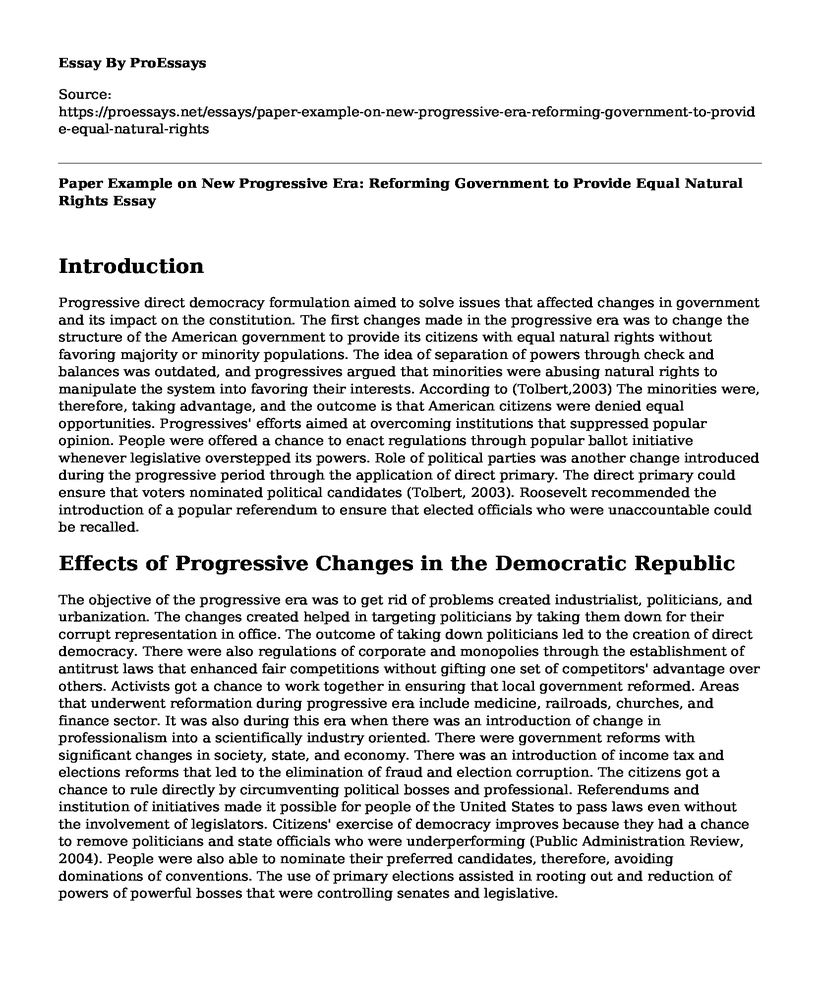Introduction
Progressive direct democracy formulation aimed to solve issues that affected changes in government and its impact on the constitution. The first changes made in the progressive era was to change the structure of the American government to provide its citizens with equal natural rights without favoring majority or minority populations. The idea of separation of powers through check and balances was outdated, and progressives argued that minorities were abusing natural rights to manipulate the system into favoring their interests. According to (Tolbert,2003) The minorities were, therefore, taking advantage, and the outcome is that American citizens were denied equal opportunities. Progressives' efforts aimed at overcoming institutions that suppressed popular opinion. People were offered a chance to enact regulations through popular ballot initiative whenever legislative overstepped its powers. Role of political parties was another change introduced during the progressive period through the application of direct primary. The direct primary could ensure that voters nominated political candidates (Tolbert, 2003). Roosevelt recommended the introduction of a popular referendum to ensure that elected officials who were unaccountable could be recalled.
Effects of Progressive Changes in the Democratic Republic
The objective of the progressive era was to get rid of problems created industrialist, politicians, and urbanization. The changes created helped in targeting politicians by taking them down for their corrupt representation in office. The outcome of taking down politicians led to the creation of direct democracy. There were also regulations of corporate and monopolies through the establishment of antitrust laws that enhanced fair competitions without gifting one set of competitors' advantage over others. Activists got a chance to work together in ensuring that local government reformed. Areas that underwent reformation during progressive era include medicine, railroads, churches, and finance sector. It was also during this era when there was an introduction of change in professionalism into a scientifically industry oriented. There were government reforms with significant changes in society, state, and economy. There was an introduction of income tax and elections reforms that led to the elimination of fraud and election corruption. The citizens got a chance to rule directly by circumventing political bosses and professional. Referendums and institution of initiatives made it possible for people of the United States to pass laws even without the involvement of legislators. Citizens' exercise of democracy improves because they had a chance to remove politicians and state officials who were underperforming (Public Administration Review, 2004). People were also able to nominate their preferred candidates, therefore, avoiding dominations of conventions. The use of primary elections assisted in rooting out and reduction of powers of powerful bosses that were controlling senates and legislative.
Contributions of Key Players in the Progressive Era
Theodore Roosevelt
During his time as a president, he activated the Sherman antitrust act of 1890 and went ahead to dissolve a northwestern railroad which was operating as a monopoly. The progressive party is the pioneer of modern politics, where it allowed for a change in traditional localized democracy through the elimination of a two-party system (Public Administration Review, 2004). He championed for direct primary after denial to be the presidential candidate of Republican Party. It was during elections of 1912 when direct primary came into practice. Direct primary became the basis for the introduction of democracy where a presidential candidate had a chance to allow voters to get involved in selecting a presidential candidate. Roosevelt championed for systematic attacks on political parties and organizations that controlled American elections. He was pro modern presidency that allowed public rule. He worked towards ensuring the formation of independent executive power that was free of corruption and influence from political parties.
References
Roosevelt the Reformer: Theodore Roosevelt as civil service commissioner, 1889-1895. (2004). Public Administration Review, 64(3), 384. Retrieved from https://search.proquest.com/docview/197176505?accountid=45049
Tolbert, C. J. (2003). Direct democracy and institutional realignment in the American states. Political Science Quarterly, 118(3), 467-489. Retrieved from https://search.proquest.com/docview/208287102?accountid=45049
Cite this page
Paper Example on New Progressive Era: Reforming Government to Provide Equal Natural Rights. (2023, Feb 09). Retrieved from https://proessays.net/essays/paper-example-on-new-progressive-era-reforming-government-to-provide-equal-natural-rights
If you are the original author of this essay and no longer wish to have it published on the ProEssays website, please click below to request its removal:
- Age in Voter Turnout Essay
- Research Paper on Comparison of the 2000 And 2004 Democratic National Convention Security Plan
- The Issue of Repeal and Replacement of the Affordable Care Act Essay
- Policies to Reduce Banking and Financial Crises Essay
- Essay Sample on U.S. Grant: From Cadet to President, A Symbol of Unity
- Liberalism & Realism: A Comparison of Political Philosophies - Essay Sample
- Essay Example on Obama Elected 44th US President: Historic Breakthrough for Diversity







